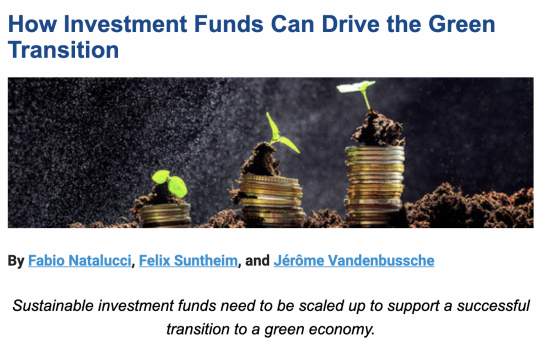Amongst the papers put out by the IMF in advance of this autumn's general meeting was this one:
 It said:
It said:
The world's $50 trillion investment fund industry, especially funds with a sustainability focus, can play an important role financing the transition to a greener economy and helping to avoid some of the most perilous effects of climate change, according to our recent analysis as part of the IMF's Global Financial Stability Report.
The focus of the work I am going with Finance for the Future is on this issue. We suggest that there is a QuEST for a Green New Deal, playing on the fact that quantitative easing, savings and tax reform to encourage savings reform are all going to have to play a part in his process. As such we welcome what the IMF is saying, and most especially these concluding paragraphs:
To this end, the IMF, together with the World Bank and the OECD, aims to develop principles for such classification systems to harmonize existing approaches and support the development of sustainable finance markets.
Second, proper regulatory oversight needs to be in place to prevent “greenwashing,” that is, ensure that labels fairly represent funds' investment objectives. This, in turn, increases market confidence and further boosts flows into sustainable funds.
Third, once those elements are in place, tools to channel savings toward funds that enhance the transition become important. For example, enhanced eligibility of climate-themed funds for favorable tax treatment in savings products (such as retirement plans or life insurance products) could help complement other climate-change-mitigation measures, such as carbon taxes.
The emphasis is mine: I think giving tax relief on green savings, and reducing or eliminating it on other forms of saving, is wholly appropriate now and an essential part of winning the battle to beat climate change.
Finance for the Future will publish more on this QuEST next week.
Thanks for reading this post.
You can share this post on social media of your choice by clicking these icons:
You can subscribe to this blog's daily email here.
And if you would like to support this blog you can, here:



This IMF paper rings alarm bells for me by highlighting “funds with a sustainability label”. How many of those funds positively contribute to sustainability? The paper acknowledges that “proper regulatory oversight needs to be in place to prevent greenwashing’” – a fine principle. As always, though, the devil will be in the detail. Regulation would need to be guided by expertise in climate science and ecology, not just in finance and tax. Rrewards for tree planting projects which provide minimal climate benefit, but maximum wildlife habitat damage, are a warning of where poorly designed tax breaks can lead.
That is why they focus on the need for a proper taxonomy
It is key now
I am very robust in next week’s paper
The devil is indeed in the detail.
The transformation of agriculture into a high short term production industry in the name of feeding the world is at the expense of small scale mixed farming , which is more efficient and sustainable. Instead we have industrialised cattle rearing fed on monocrops relying on high inputs of fertilisers , pesticides and insecticides; and heavy machinery which compacts the soil.
Politicians like to offer cheap food and receive gifts from big business making the profits from such a system.
I fear green energy could be the same. Battery manufacturers desperate to recover huge abortive investment in battery production that will pass on the costs to gullible consumers. Investment in transport infrastructure which increases travel rather than reduces it; Higher standards in housing which reduces the numbers of units built to increase house prices to benefit house builders; off shoring industrial production which merely green shifts etc.
A sliding scale of energy charging penalising big consumers would do the trick ; rewards to childless couples; taxation of aviation fuel; nationalisation of land banks for national building programme for energy efficient care homes and homes for the elderly rather than executive homes in the green belt on prime agricultural land; Free thermal underwear; Higher taxation of higher consumers.
Its not difficult to save energy. Its more difficult to balance the long term prospects for humanity with the short term needs of politicians.
Very good to be able to cite IMF. It would be a very convincing part of the answer to Andrew Marr/Nick Robinson/Evan Davis and co. . ..inevitable ‘but where will the money come from? who are you going to tax?, borrowing going through the roof? etc.
Condensing to a sentence in a one-page manifesto not easy, but worth a try.
All projects specially those classed as GREEN should not be evaluated on a “Business Case” as currently but based on embodied and lifetime CO2 emissions. Note that repair ability and planned lifetime should also be taken into account. In fact all consumer goods should also be evaluated this way. An example that worries me is lithium batteries have a limited life currently about 1,000 recharges before the capacity starts dropping significantly. A phone battery only lasts about 3 years and my 6 year old laptop is awaiting its third battery. In fact all batteries have a similar life.
Re: battery lifetime / lifecycle. I always thought the mountain of metals and other expensive elements within faded old batteries sort of resembled a mine. Just like when these elements were recovered from the earth prior to smelting / manufacturing / utility / discarding / recycling. Is there a reason Lithium is not capable of being recovered smelted and used again?
I whole heartedly agree.